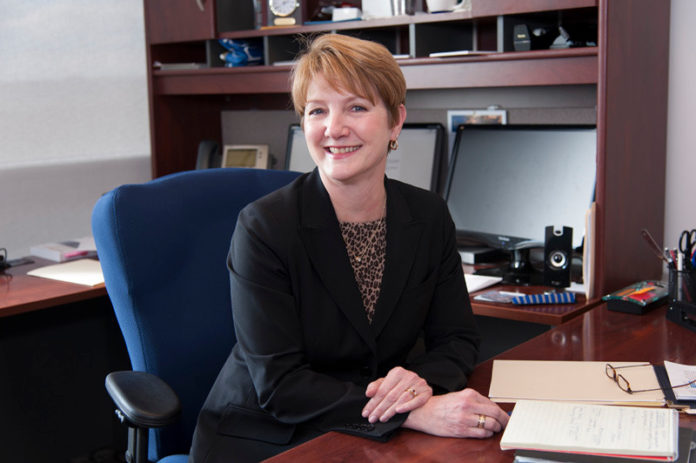
Deborah L. Sheely is a biologist whose Ph.D. research studying trees in the Micronesian islands in the mid-1990s eventually led to a 16-year stint working for the U.S. Department of Agriculture. Much of that time was spent working through the National Institute of Food and Agriculture (formerly the Cooperative State Research, Education and Extension Service).
After relocating from Washington, D.C., to New England, with her husband, who took a job at the University of Connecticut, she joined the staff at the University of Rhode Island in February. She now runs the URI Cooperative Extension.
PBN: What aspects of your work with the U.S. Department of Agriculture are you finding relevant in your role at URI?
SHEELY: Lots of things. The agency that I worked for, the National Institute of Food and Agriculture, is the federal partner to the land-grant university system. As such, while at NIFA I had a lot of interaction with land-grant universities providing federal financial assistance – grant dollars for research, teaching and extension. I had these great connections and I was very interested in this thing called extension, and it’s through this extension that the university really connects with the community.
PBN: So what is this thing called “extension”?
SHEELY: Extension is informal education. It usually takes place outside of the traditional classroom and it’s the mechanism by which the university delivers science-based information to the public – agriculture producers, members of the community, anyone who would benefit from it.
PBN: How is the service relevant to Rhode Islanders?
For example, if you take our fruit and vegetable growers here, we provide a lot of assistance … helping them learn about the latest production methods, best practices, helping them identify and deal with pests, weeds and diseases. We also work with our livestock, poultry and dairy producers. We also work closely with the fisheries and aquaculture communities.
PBN: This year is the national Cooperative Extension system’s 100th anniversary. How is URI celebrating?
SHEELY: We’re going to host a series of events in mid-October intended to raise awareness on campus and within the community about Cooperative Extension. It’s going to be a series of learning activities for students, some things that help them learn a little bit about energy, food safety and water quality.
PBN: Obesity prevention is a hot topic that the Cooperative Extension is actively researching. What is new at URI in this area?
SHEELY: Some of our most impactful activities conducted by the URI extension do fall into that the category. We’re working with low-income residents teaching them nutrition. We’re working with elementary school children and their parents on nutrition and the importance of a more plant-based diet for better health and preventing obesity. It’s that hands-on, face-to-face interaction teaching parents actually how to cook fresh vegetables, getting kids to try fresh vegetables. It makes a huge difference in getting them to change behavior.
PBN: Farming and monitoring water quality are areas where the service guides the agriculture industry. Which of these is the fastest growing in Rhode Island?
PBN: What form might that take?
SHEELY: It’s going to take actually increasing the amount of food that we produce here, changing the distribution systems, making that food available locally, getting Rhode Islanders to buy more of their food from local sources, to make it a priority.
PBN: Any new programming in the works?
SHEELY: This notion of a strengthened regional food system is something we’re beginning to work on. Cooperative Extension in Rhode Island is partnering with Cooperative Extension in the five other New England states to work on this together.
PBN: What’s your vision for the extension’s future?
SHEELY: Another thing I’m working on is doing some strategic planning for Rhode Island. I plan to go through a reasonably formal process over the next six to nine months to listen broadly to the people of Rhode Island, our stakeholders, and hear what they need and want from us. Then take all of that input and put it into a strategic plan and set some new directions. …
The most recent version of the strategic plan I can find was done in late 1997. •
INTERVIEW
Deborah L. Sheely
POSITION: Associate dean and associate director of the University of Rhode Island Cooperative Extension
BACKGROUND: Sheely has spent most of her career – since 1997 – working administratively for the U.S. Department of Agriculture and/or its Cooperative State Research, Education and Extension Service. From October 2010 until she was hired in February at URI, she served as the USDA’s assistant director within the extension service, now known as the National Institute of Food and Agriculture, overseeing one of four science institutes, the Institute of Food Production and Sustainability.
EDUCATION: Ph.D. in plant biology from Rutgers, the State University of New Jersey in New Brunswick, 1995; bachelor of science degree in agriculture from the University of Missouri, 1986
FIRST JOB: ice cream maker and server
RESIDENCES: South Kingstown and Coventry, Conn.
AGE: 54












